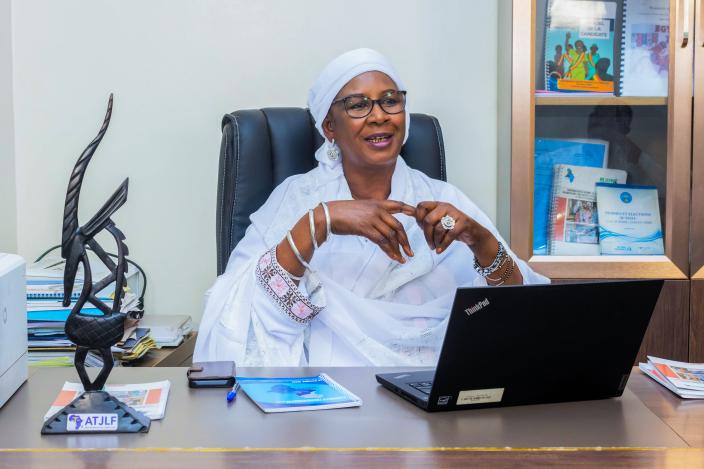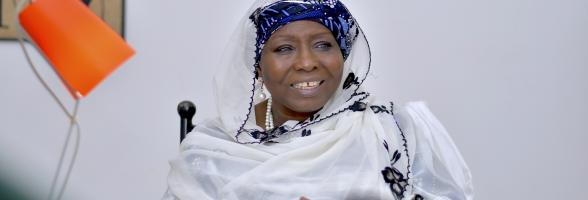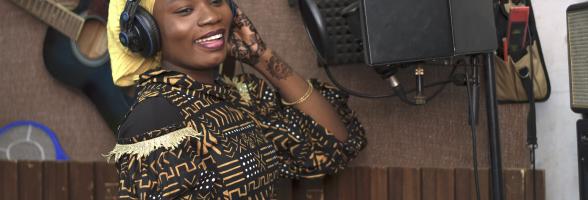“Women are involved in raising awareness and advocating for peace. Unfortunately, they are not always consulted or sufficiently represented in decision-making bodies.”
Maiga Sina Damba is the President of the Network of African Women Ministers and Parliamentarians (REFAMP/Mali), a network that was set up in Mali in 1996. Ever since, they have been working relentlessly for the emancipation and advancement of women. REFAMP has been promoting equal representation of women and men in decision-making bodies at national, regional and international level by building the advocacy skills of women leaders.
Question: Can you tell us about your journey in the fight for women's emancipation in your community?
Maiga Sina Damba: If I have to tell you about my background, I'll go back to my childhood. I grew up with my mothers in a traditional African family, where I saw them struggle every day to ensure the family's survival, whether in the home or in the fields (domestic or agricultural work). It made a big impression on me and since then I've decided to fight to one day contribute to improving living conditions by empowering and emancipating women, especially in rural areas, particularly in the Soninke community. I quickly realised that I had to take my studies very seriously and get a degree to escape this life and also early marriage: the fate of every young Soninké girl at the time was marriage and then the same fate as that experienced by women: marriage, home, children to bring up in difficult situations. So I was able to continue my studies all the way to university, where I got my master's degree in law. I had just escaped a system that had been established for girls and women since the dawn of time.
After my studies, I got involved in community work. From training course to training course, from conference to conference, from Mali to other African countries, from Africa to other continents, I was able to learn many things, to come into contact with many experiences and finally to develop my leadership skills. Thanks to these leadership experiences, together with other colleagues I founded an NGO called Association de Formation et d'Appui au Développement (AFAD). AFAD's mission is to help improve the living conditions of women and children through equitable access to basic social services such as health, education, drinking water and shared governance of natural resources. I worked with AFAD for a dozen years before becoming Head of Cabinet in a ministerial department for five years.
I then had the honour and privilege of being appointed Minister for the Promotion of Women, Children and the Family between 2007 and 2011. This role allowed me to be at the heart of decision-making and to demonstrate my leadership. During my time at the head of the ministry, thanks to the political will shown and the commitment of my team, we were able to draw up Mali's national gender policy, which is now the reference framework for all action taken by the government and its partners to promote gender equality and equity in Mali.
Question: Can you tell us about any conflicts or cases of insecurity that you have experienced in your community? And how were these conflicts resolved?
Maiga Sina Damba: I feel bitter every time I have to talk about issues of peace and security for my country. In the past, I knew a stable and calm country where life was good in all our communities through mechanisms such as joking cousins[1] and many others. Unfortunately, for more than a decade now, I have seen my country torn apart, shredded, with a multidimensional crisis that has shaken the very foundations of the Republic. The crisis has especially affected the lives of women, girls and the elderly. Their fundamental rights have been violated.
I also saw young men with amputated limbs accused of theft, families separated or displaced, children abandoned. In Bamako, among the displaced populations, we met women and girls who had often been gang-raped. Worse still, children have been born of these rapes. What will become of these children? It's very painful to remember some of the victims' stories. We saw displaced persons camps in several places in Bamako, but also refugee camps in neighbouring countries such as Niger, Burkina Faso and Mauritania.
At the time, the women of Mali, through their associations, NGOs or coordinations, provided financial and material assistance to these communities in difficult situations. At the time, Mali's women leaders were not prepared for such situations, so we called on partners such as UN Women to organise capacity-building sessions for women in conflict management techniques and conflict resolution mediation.
Question: What was your involvement in resolving these conflicts?
Maiga Sina Damba: I did not act alone. We had the opportunity to share the experiences of our sisters in Côte d'Ivoire, Rwanda, Sierra Leone, Mano River, etc...
After sharing the experiences of other women, we rallied around the idea that women should be more involved in conflict prevention and management, because they and their children are the most vulnerable. Unfortunately, the men who are at the root of conflicts are also the main players in negotiations and mediation.
I would also like to inform you that I have been closely involved in the mediation and management of the conflict in Mali. I am one of nine women appointed to the Follow-up Committee of the Agreement for Peace and Reconciliation in Mali resulting from the Algiers Process.
Question: Why do you think women play a key role in peacebuilding in general?
Maiga Sina Damba: Women bear the brunt of the impact of conflict. They are forced to flee. They abandon everything, including their income-generating activities. They remain the most vulnerable people. For this reason, they must be sufficiently involved in conflict resolution. For example, article 51 of the Agreement for Peace and National Reconciliation calls on women's and youth organisations and traditional authorities to give their full support to achieving the objectives of the Agreement. The CSA has met more than forty times, and we women members of this Committee have drawn the attention of decision-makers to the effective participation of women in the various mechanisms set up to implement the Agreement at all levels: local, regional and national. At each session, we have emphasised access for women and their children to basic social services (schools, health centres, drinking water, energy, etc.).
Question: Do you think that women are sufficiently involved in the search for peace in Mali? If not, what are the obstacles to their involvement?
Maiga Sina Damba: Yes, I think that women are involved in raising awareness and lobbying for peace. Unfortunately, they are not always consulted or sufficiently represented in decision-making bodies to impose peace. However, UN Security Council Resolution 1325 of 31 October 2000 and subsequent resolutions urge our States to take a number of measures to encourage the representation and participation of women in the prevention, management and resolution of conflicts, and to promote respect for and protection of their rights.
Question: What are your dreams for peace in your community/ country?
Maiga Sina Damba: I have a beautiful dream for my country. I dream of the Mali of peace and sharing that I knew in the past. Along with all my compatriots, I dream of returning to those moments of joy and solidarity by creating the conditions for lasting peace. I am convinced that these days will undoubtedly come. You see? In the past, Dogons and Peulhs lived in harmony in central Mali. That all changed with the crisis, when these communities took up arms or were armed against each other. We need to bring back the age-old understanding that existed between these two ethnic groups. I dream of the Mali bequeathed to us by our fathers, grandfathers and great-grandfathers. I dream of a Mali where relationships between neighbours, marriage and kinship, including schooling, were sacred and respected by all. I dream of a Mali of peace, understanding, solidarity and sharing, a Mali where Diarra and Traoré, Coulibaly and Kéïta, Peulhs and blacksmiths, Soninké and Malinké, Dogonos and Sonrhaï are cousins, etc.... The women of Mali are going to recreate this Mali, in shaa Allah.
Interview and processing by Lalaissa Maiga, Adijatou Maiga and Djigui Keita of Oxfam in Mali
[1] Joking cousins is a social practice in West and Central Africa that allows or obliges members of the same family, certain surnames, certain ethnic groups or inhabitants of a particular locality to make fun of each other without anger, frustration or resentment. (Source: Wikipedia)


